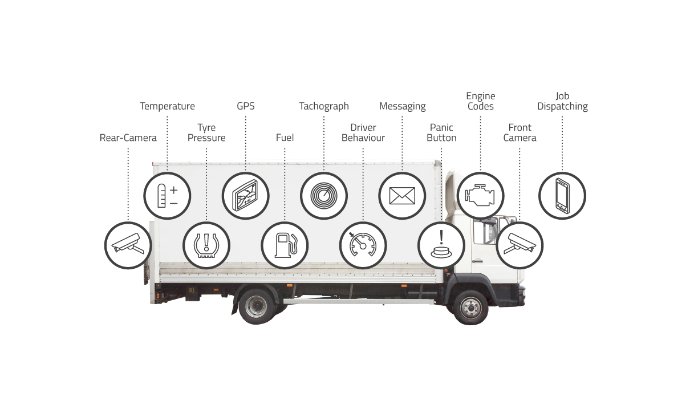The IoT Revolution in Fleet Management
In an industry where fuel costs have always been a concern, you would think that today’s fuel prices would be giving fleet operators some relief. According to Fleet Financials Magazine, however, the truth is that, “while fuel costs have decreased, the costs for most other fleet categories have increased, resulting in upward pressure on a fleet’s total cost of ownership.”
Fleet operators are dealing with increasingly complex government regulations aimed at improving safety and reducing environmental impact. Budgetary constraints, softer resale values, staying current with many regulations, and uncertainty over fuel prices are just a few of the industry’s concerns.
 Download free our eBook “Introduction to Fleet management” that develops our methodology in order to manage any type of vehicle fleet through all his activities, variables and key factors involved.
Download free our eBook “Introduction to Fleet management” that develops our methodology in order to manage any type of vehicle fleet through all his activities, variables and key factors involved.
Fleet owners are turning to technology to help them achieve regulatory compliance with safety and environmental legislation, while minimizing total cost of ownership (TCO). The internet of things (IoT) is one of the hottest topics in the industry as fleets adopt telematics-enabled applications to revolutionize fleet operations.
IoT enables safer, cleaner, more cost-effective fleet operations
Driver behavior is one of the most difficult safety areas to monitor in a fleet. With a connected fleet management solution (FMS) that collects and analyzes vehicle data, fleet operators can detect aggressive driving behaviors that compromise safety. They can respond quickly to hold drivers accountable and identify which ones need more training or supervision.
Decreased fuel consumption and lower emissions go hand-in-hand. FMS can optimize vehicle routes to reduce distances and idling time; applications can even monitor tire pressure to improve gas mileage. And telematics data from vehicles can provide fleet owners with proof of compliance with environmental regulations.
FMS can also reduce fleet maintenance costs. Constant monitoring and assessment of vehicle condition allows fleet operators to schedule maintenance as needed, rather than on a mileage basis, and in many cases lengthens the intervals between preventive maintenance tasks. Since telematics data helps flag potential problems, maintenance becomes both proactive and pre-emptive.
At the same time, the technology that keeps an FMS connected is also a factor when it comes to TCO.
Seamless connectivity, deployment, and upgrades
FMS depends on consistent, quality data connections. This can be an issue when trucks drive through rural areas, between countries, or even across boundaries where cellular providers and network types change. The best option is to deploy Smart SIMs that can switch seamlessly between providers and accessible networks, always selecting the signal that best suits the applications being used.
To complicate this landscape, over the next five years, carriers are expected to upgrade their networks from 2G/3G to 4G/LTE; so a cellular module that is compatible with networks on a route today may not be compatible tomorrow. A commercial vehicle could be in the field for five – seven years. Rather than face the cost (and the impact on TCO) of physically swapping out modules as networks migrate, solution providers and fleet owners are better off deploying scalable modules supporting 2G/3G to 4G/LTE and that can be upgraded over-the-air to handle new network configurations.
Network compatibility is only one part of the equation for fleet management TCO. The long life cycle of a fleet means software fixes and application upgrades are inevitable. While over-the-air updates are essential for containing TCO, solution providers need cost-effective ways to build additional value-added services. To future proof your deployment, look to open application frameworks that can simplify integration challenges and accelerate time to market.
Sierra Wireless solutions have enabled FMS for commercial fleets worldwide. Read about the challenges, benefits, and recommendations in our latest white paper: Leveraging the IoT Revolution in Fleet Management.
 Written by
Written by
Join to my Facebook and LinkedIn pages focus on Fleet Management, each week we publish posts, conferences, news and technology related to Fleet Management.
The main goal of this course is to provide the knowledge and the skills to manage any kind of vehicle fleet through all its activities and key aspects. The course is aimed to executives, middle managers, fleet managers and any professional related to fleet management.
Know our fleet management course
The audit is a key tool to know the overall status and provide the analysis, the assessment, the advice, the suggestions and the actions to take in order to cut costs and increase the efficiency and efficacy of the fleet management. We propose the following fleet management audit.







